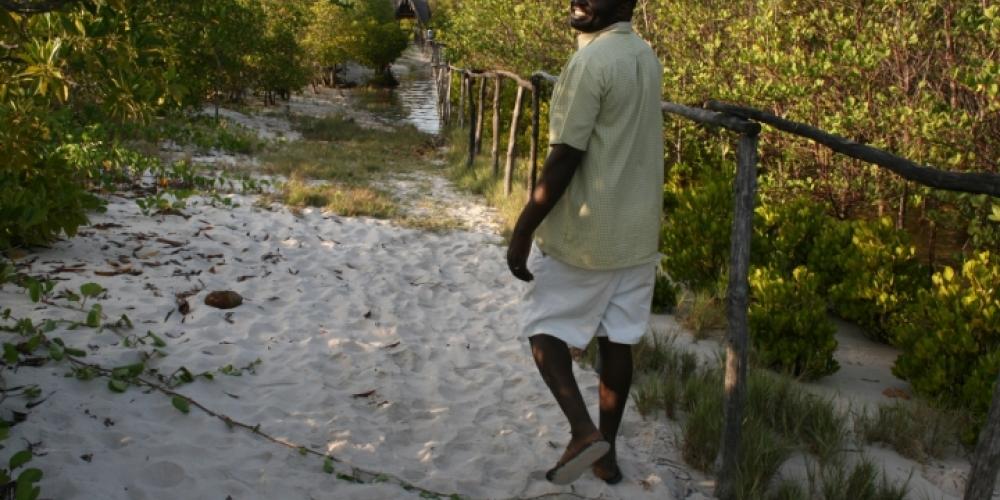
NULLMangroves are the epitome of life. They harbour species and life forms that cannot be found elsewhere. But above all they are the life support of communities around the world. Estimates from 2017 have shown that in East Africa alone, mangroves represent an asset of almost €40 billion through products and ecosystem services. This is the basis of James Kairo's fascination for mangroves and marine ecology, which eventually brought him to Brussels.
This award shows that no matter where you come from, you can make a difference if you fight for local communities and local environments.
Warning: climate change
Kairo did most of his early work in Gazi, a small coastal fishing village in Kenya. The Mikoko Pamoja project is a great example of how local communities can benefit from mangroves while protecting them at the same time. Mangroves protect coastal areas, and provide habitat for fish and other wildlife, but they also capture and store large amounts of carbon. They accumulate more carbon per hectare than most other ecosystems, often five to 10 times as much as tropical forests, so they play a large role in protecting the climate. When mangroves are cleared and the land converted for other uses, the carbon is released as carbon dioxide into the atmosphere. So, protecting the mangroves is vital in managing climate change. The local communities learned about this protective role and set up a credit selling system to offset carbon dioxide emissions. The income generated from the system amounts to €15,000 a year, and is used to support community development projects in water, sanitation and education, as well as for mangrove reforestations. The Mikoko Pamoja project is a triple win for the climate, the community and biodiversity and serves as a global example.
“James Kairo came here as a PhD researcher. He expanded the mangrove research and project. Today it’s one of our biggest research areas, and one that has since been extended to the ULB, and has resulted in extensive international collaboration for all involved.” says Nico Koedam.
Going global
Kairo, however, wasn’t satisfied with keeping his mangrove research within academia. He had seen how vulnerable coastal communities relied on mangroves but also saw the rate at which they were degrading and disappearing. The next step? A remarkable career in marine ecosystems, and studying the role of mangroves in the climate change process. Today, he is a chief scientist for the Kenya Marine and Fisheries Research Institute (KMFRI), and a pillar of the community, active in national and international policy-making, with some impressive achievements under his belt. He has raised the profile of marine ecology and mangrove management across the world, and supported the development of national mangrove management plans for Kenya and Egypt. He has supported development cooperation in the marine sector, and while travelling the world as a consultant to governments, he’s become an ambassador for mangroves. His ambition: to promote alignment of community and conservation interests with economic incentives, supported by the conviction that science can provide creative solutions to counteract prevalent environmental pessimism.
What does this VUB Fellowship mean to Dr Kairo?
“It is humbling for me, as a former VUB student. I can now give back to the university by helping their students when they come to Kenya. The training I got opened the world to me. Literally. This award shows that no matter where you come from, you can make a difference if you fight for local communities and local environments. My education in Brussels was a stepping stone from the local to the international level, and changed everything for me,” explains Dr Kairo. Professor Koedam adds, “James has built an impressive international career and network that is unmatched. He is active in international platforms such as the Intergovernmental Panel for Climate Change (as coordinating lead author for the special report on oceans and the cryosphere under a changing climate, due in 2019) and the UN Framework Convention on Climate Change COP21 conference, and he developed a unique carbon credit system connecting mangrove protection to food security, coastline protection and the fight against climate change. He is a versatile man, who finds time to help students in Kenya, and one of the most productive people I’ve ever met. Thanks to him, Gazi has become a model for an international research hub.”
Oceans & Lakes
The Oceans & Lakes programme (a joint degree between VUB, the University of Ghent and the University of Antwerp) offers a multidisciplinary approach to marine and lacustrine systems by integrating physical, chemical, geological, ecological, legislative and societal aspects to encourage students to consider conservation and sustainability in a real-world context. It’s the only one of its kind in Europe. It’s a good degree to have in today’s world as well, with ever-increasing pressures on marine and freshwater ecosystems. The need for highly educated people to work on these issues with multidisciplinary expertise has never been greater. With students from across the world, it facilitates networking on global problems. Since it was set up the programme has produced 10% of researchers at the KMFRI, colleagues and collaborators of Kairo, while other graduates can also be found in key governance positions.
www.oceansandlakes.be
WHAT ARE VUB FELLOWS?
VUB Fellow is a title bestowed on unique personalities such as top-level company executive officers or staff members, visionary politicians or decision-makers, and leading figures of civil society organisations. The Fellowship is the highest grade of membership for our Alma Mater. Through the VUB Fellowship programme, academics, society and business meet to discuss joint challenges, exchange experiences and share good practices. This year 36 people will be made fellows. The ceremony takes place on 21 June in Concert Noble, Brussels.
vub.ac.be/fellowship